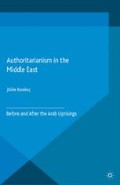Abstract
After unexpectedly breaking out in the last days of 2010, the Arab uprisings — or Arab Spring to use the more optimistic label — continue to have unforeseeable consequences. The effects of the first incidents moved across borders throughout the Middle East, with waves of revolt rapidly spreading out beyond the region. Tunisia was the birthplace of the Arab Spring1 when Mohammed Bouazizi, a local vendor, set himself on fire to protest the humiliating treatment he had received at the hands of the police just because he was accused of lacking any official permit to sell his fruit. His tragic reaction sparked countrywide protests in December 2010,2 with the main target of the protestors being the corruption and repressive policies of President Zine El Abidine Ben Ali, who fled the country on January 2011 after Tunisia’s armed forces refused to intervene in the protests.3 It quickly became clear that the flames of these protests were permeating the Middle East, giving birth to sudden, unexpected consequences. The people of all Arab countries, who had fallen into the hands of despotic dictatorships in the postcolonial era, made strong demands for a better life in every sense. Shortly after the Tunisian upheaval, popular protests took place in Egypt, Libya, Yemen, Jordan, Algeria, Lebanon, Morocco and later Syria. These encouraging developments implicitly inspired all those subjects of North Africa and the Middle East who were struggling for a fairer, democratic society.
Access this chapter
Tax calculation will be finalised at checkout
Purchases are for personal use only
Preview
Unable to display preview. Download preview PDF.
References
Ahmed, I. (1997) “The Republic of Kurdistan: A Personal Memoir,” International Journal of Kurdish Studies, 11 (1–2), pp. 9–32.
Altug, S. (2013) “The Syrian Uprising and Turkey’s Ordeal with the Kurds,” Dialectical Anthropology, 37, pp. 123–130.
Çakır, R. (2010) “Kurdish Political Movement the ‘Democratic Opening,’” Insight Turkey, 12 (2), pp. 179–192.
Dahlman, C. (2002) “The Political Geography of Kurdistan,” Eurasian Geography and Economics, 43 (4), pp. 271–299.
Daragahi, B. (2014) “Syria’s Kurds Initiate Experiment in Self-Rule,” (London) Financial Times Limited, pp. 1–2, http://www.ft.com/cms/s/0/64e97c3e-8465-11e3-9710-00144feab7de.html#axzz3LWwyIME6 [accessed July 20, 2014]. Ensaroğlu, Y. (2013) “Turkey’s Kurdish Question and the Peace Process,” Insight Turkey, 15 (2), pp. 7–17.
Entessar, N. (2010) Kurdish Politics in the Middle East. Lanham, MD: Lexington Books.
Fuller, G.E. (1993) “The Fate of the Kurds,” Foreign Affairs, 72 (2), pp. 108–121.
Gambill, G.C. (2004) “The Kurdish Reawakening in Syria,” Middle East Intelligence Bulletin (jointly published by the United States Committee for a Free Lebanon and the Middle East Forum).
Gresh, G.F. (2009) “Iranian Kurds in an Age of Globalization,” Iran and the Caucasus, 13, pp. 187–196.
Gunter, M.M. (2004) “The Kurds in Iraq,” Middle East Policy, 11 (1), pp. 106–131.
Gunter, M.M. (2004) “The Kurdish Question in Perspective,” Word Affairs, 166 (4), pp. 197–205.
Gunter, M.M. (2007) “Review of The Kurds in Iran: The Past, Present and Future by Kerim Yildiz; Tanyel B. Taysi,” Middle East Journal, 61 (3), pp. 539–540.
Gunter, M.M. (2013) “The Kurdish Spring,” Third World Quarterly, 34 (3), pp. 441–457.
Karakoç, J. (2010) “The Impact of the Kurdish Identity on Turkey’s Foreign Policy from the 1980s to 2008,” Middle Eastern Studies, 46 (6), pp. 919–942.
Ünver Noi, A. (2012) “The Arab Spring, Its Effects on the Kurds, and the Approaches of Turkey, Iran, Syria, and Iraq on the Kurdish Issue,” Middle East Review of International Affairs, 16 (2), pp. 15–29.
Wiarda, H.J. (2012) “Arab Fall or Arab Winter,” American Foreign Policy Interests: The Journal of the National Committee on American Foreign Policy, 34 (3), pp. 134–138.
Zurutuza, K. (2013) “Syria: Kurds Advance, into the Unknown,” Global Information Network.
Editor information
Editors and Affiliations
Copyright information
© 2015 Turan Keskin
About this chapter
Cite this chapter
Keskin, T. (2015). The Impact of the Arab Uprisings on the Kurds. In: Karakoç, J. (eds) Authoritarianism in the Middle East. Palgrave Macmillan, London. https://doi.org/10.1057/9781137445551_6
Download citation
DOI: https://doi.org/10.1057/9781137445551_6
Publisher Name: Palgrave Macmillan, London
Print ISBN: 978-1-349-49580-1
Online ISBN: 978-1-137-44555-1
eBook Packages: Palgrave Intern. Relations & Development CollectionPolitical Science and International Studies (R0)

